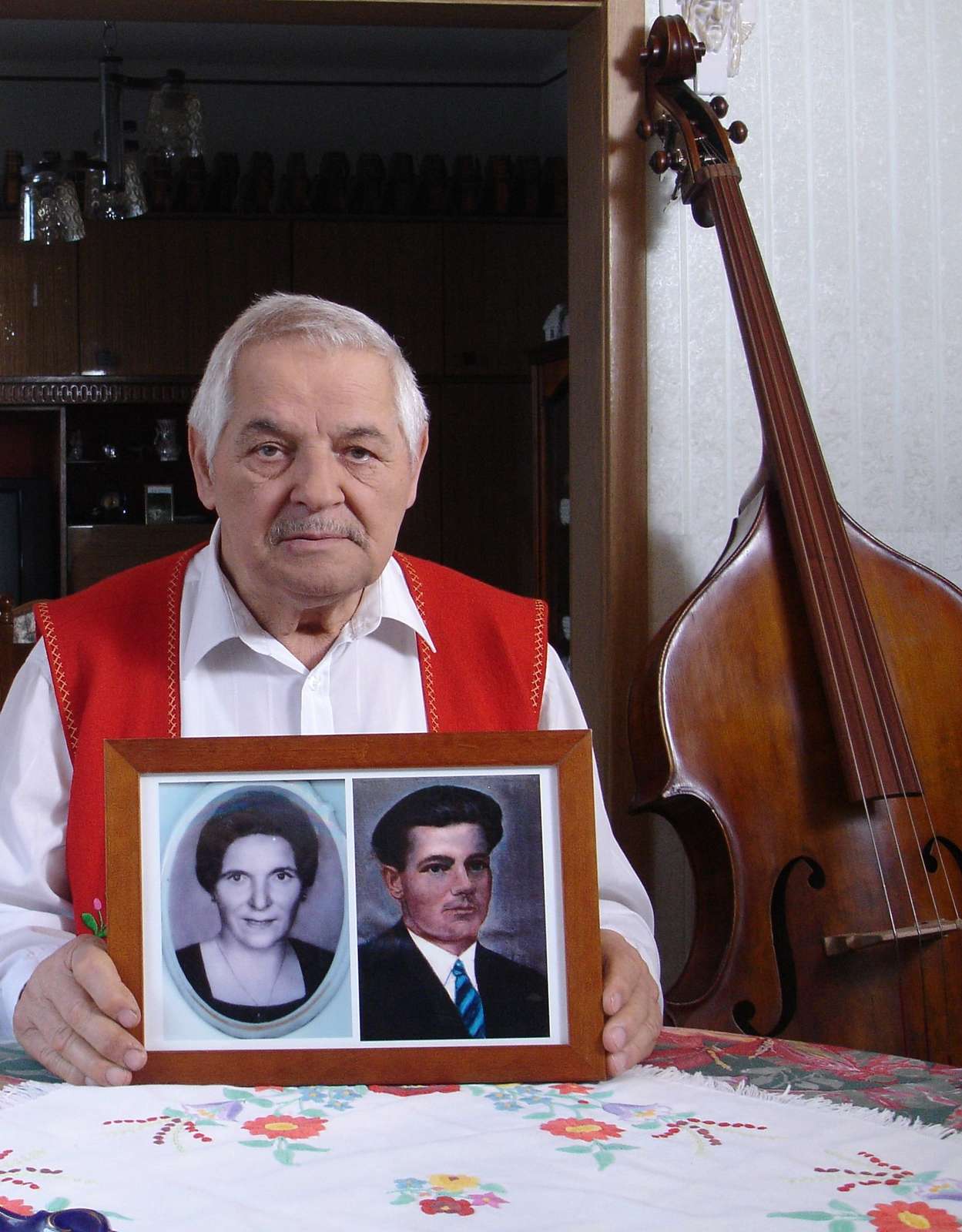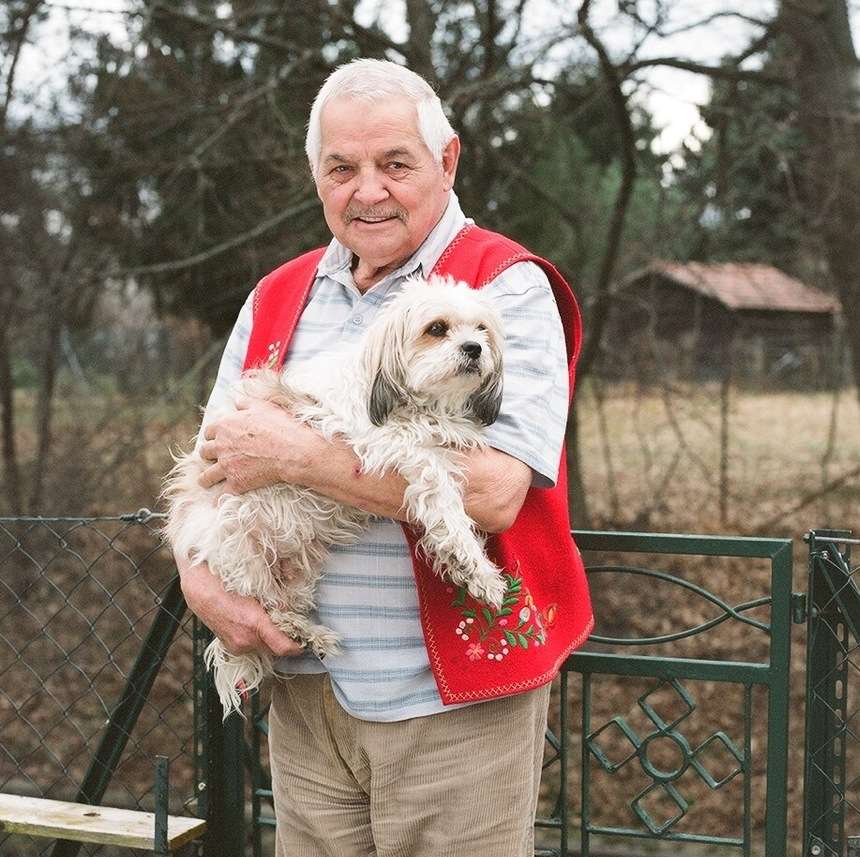Adolf Papai
If it had lasted another year, there would have been none of us left
Adolf Papai was born on 28th June 1931 in Langental in central Burgenland, where around 350 Roma lived in great poverty. Less than one third of them survived the National Socialist era. Together with many other Roma from Langental, Mr. Papai's father was deported to Buchenwald and murdered. Mr. Papai himself and his mother and siblings were put in the Lackenbach camp.
The following excerpt from Mr. Papai's life story is taken from an interview (conducted in Romany) from the contemporary witness documentation "Mri Historia. Life stories of Burgenland Roma" by the association "Roma Service".
I was eight years old and already had to go out to work. There were good farmers, for whom I did some small jobs. They were small farmers and they gave us milk and a piece of bread to eat. We were pleased to get something. It was a distance of seven kilometres from us, from Langental via Nebersdorf to Kleinwarasdorf. I used to walk there and I worked in the fields, harvesting potatoes and things like that, and that is how we got something to eat. […] Yes, the other Roma… there wasn't much work. They didn't find any work so they went music-making at the country fairs […] and their wives had to go begging, just so they could survive. […]
And then, in '38, it was announced that we were not allowed to attend school. We learned Croatian in school and once a week we had a German lesson. I went from the first grade into the second, in total I went to school for one and a half years. We had such a good teacher. He let us continue to go to school even when it was already forbidden. He still taught us in spite of this. Then he was found out, he was nearly deported to a camp, that I am sure of. […] His name was Gyöngyes. He was very good to the Roma. […]
He [Mr. Papai's father] was off playing music, and he was on his way home. Right at that time they were rounding up the Roma and they took him with them. They didn't even let him go home. He wasn't far away from our house, and then they took my father with them. They also took my mother, but they let her go again in Fischamend because she had a young daughter who she was still breastfeeding. They left a few behind, if they had small children. In 1941, they didn't take such things into account any more, small children and the like, they deported all of us. […] There were four of us; three sisters and myself, and one was still a small baby, one girl was a bit older, then another, then me, and our mother was very sick. We just hid in the forest. We could hide there in Langental but not anywhere else. […]
In 1941, we were put in a camp. That was around October. I don't know any more. We made wreaths for All Saints Day and our mother had carried them into the village to sell them or exchange them for flour or other food so that we would have something to eat. And I still know, I was tired at the time and I fell asleep on the brushwood at a neighbour's house. And suddenly the "Poskoschtja" [1] came and they took us away from there. They threw us on to a car, and they hit us hard too, and then they took us to Lackenbach. […]
I had a little dog. […] I was still a child and I wouldn't hand it over. And when we arrived there in the car, there were already some people there; the Kapo [2] and those who had been imprisoned in 1940. And we got off the truck and I didn't let the dog out. And then, one of them took the dog, the poor dog, by the hind legs and hit me with him for so long, until only the hind legs remained in his hand. That was how terrible these people were! Because I didn't let my dog out. […]
I had to sweep the courtyard every day and keep it tidy and everything else that needed doing, cleaning the toilets and such, that was my job. [...] In the morning, at around half past six, we had to line up already. The oldest in the camp or one of those in the courtyard had a whistle, and when it was blown, we had to run and line up and then go to work. […] If it wasn't tidy, we were beaten. But since we knew that, we made sure that we did our work well. They sent us out to dig up roots from the forest to make brushes, rice brushes and so on. [...] The very young children stayed in the stalls but their parents had to go out to work. And the children were left behind in the straw. I still remember, some froze to death in the straw. It was so cold. Many froze to death and a few who didn't freeze grew up together. […]
They killed 250 Roma [3]. They died in Auschwitz. They burnt them, they gassed them. And then we got typhoid when I was in Lackenbach. Many people also died there. […] I brought them water, as there was a well in the camp and it is from this water that the disease came. I was allowed to leave the camp. There was a small spring, so I went there and brought many sick people water from there. But despite this, many people still died. […] They threw them up onto a kind of platform-lorry like lumps of wood and then brought them to a hole. So many died of typhoid. […]
In March 1943, I got out of there and went to Langental, to the hunter. […] They had two cows, and he was the hunter of the Earl Niczky in Nebersdorf [4]. […] I helped him make wood, small jobs like that. And took care of the two cows and washed them. They always had to be as clean as a whistle. The Earl had taken many Roma from the camp, my mother, my sister and also many for whom he did not even have work, saving their lives. He was one of a kind. […]
After the war, the Papai family's house was still standing – unlike many other houses in Langental. Adolf Papai's mother died in 1949 from the effects of a stroke. His sisters moved to Vienna; he was left alone. Mr. Papai, who, like his father before him, played in a Roma band, married in 1951 and has three children. Despite his brief education, which he was partly able to catch up on by learning with his children, he has remarkable linguistic abilities.
I speak Croatian and German and Romany, Hungarian and the Slavic languages, a little Czech, Yugoslavian best of all, and then Russian too […].
Adolf Papai's wish for the future is that the history from 1938 to 1945 is never repeated.
First publication of this article in: Renate S. Meissner on behalf of the National Fund (Ed.): Lives Remembered. Life Stories of Victims of National Socialism. Vienna, 2010, pages 244-249.



